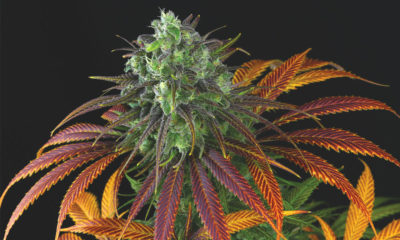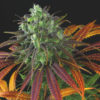
Strains
Stop Saying ‘Skunk’ & Just Say Cannabis
In the United Kingdom, any cannabis with more than 10 percent THC is referred to as “skunk,” and treated as some mind-bending, psychosis-guaranteeing superdrug. It’s not — it’s just cannabis, and saying “skunk” is pure Reefer Madness-level paranoia.
Earlier this year, GW Pharmaceuticals, the UK-based producer of Sativex, Epidiolex and several other cannabis-derived patented drugs — and, by some accounts, the largest exporter of raw marijuana in the world — funded a study examining the UK’s cannabis supply. The results set off a round of alarms.
For many years, cannabis users in the UK had to make do with either hashish, or “cannabis resin,” as it is classified, or seedy, weak weed. Those days are gone. Researchers with the company and at Kings College London analyzed the marijuana seized by UK police, and 94 percent of that illicit cannabis turned out to be “super-strength skunk,” according to a report in the (state-funded) BBC.
If you are an American, here is where you ask the inevitable question: “What the heck is skunk? And how is it different from regular old weed — which, as an informed person with access to the internet, I know to be relatively benign?”
Skunk, broadly, is weed that is not terrible. Which is to say: It is marijuana, cannabis. It’s weed. It’ s stuff you know — and know to be relatively benign. There is absolutely no genetic, botanical, or scientific difference between cannabis and skunk.
What difference there is exists solely in the branding. That is, “skunk” is the term the British press trot out whenever they’d like to demonize marijuana and make it more difficult for the conversation around the drug to enter the 21st century. The corrosive effect on discourse is obvious.
Imagine referring to alcohol as “devil’s drink” or cigarettes as “cancer sticks” — and in the mainstream press, for years at a stretch — and then imagine trying to have a rational conversation.
As the NHS pointed out, skunk is “sinsemilla,” Spanish for “without seeds,” or the lingo your parents or grandparents used in vain in the 1970s to score some pot that wasn’t stems, seeds and lawn clippings before the Rush concert. Nearly all the flower on every shelf in every dispensary in America would qualify as “skunk” — and if it didn’t, you would be in a dispensary you would likely never visit again.
In a way, “skunk” is a success story. There really isn’t an analogous loaded word in America used to conveniently denigrate the plant, though that did not stop drug warriors from trying. In 2009, then-US Rep. Mark Kirk, an Illinois Republican, pushed a law that would have mandated a 25-year prison sentence for anyone selling cannabis with more than 15 percent THC. Kirk’s bill failed, but Kirk ended up in the U.S. Senate. Over in the UK, look at how the term is used: Here’s the UK Daily Mail in 2015, comparing “skunk” to heroin and, for some bizarre reason, moonshine. (Does that sound familiar?)
Like bootleg alcohol, this article claimed, skunk “destroys people.” This is the Pavlovian effect. When British people hear “skunk,” they think madness, addiction, and societal decay. They think this, rather than thinking, “Is it really a good idea to put this drug in the same category as heroin and other drugs that actually kill people?”
Medical cannabis patients in the UK have done their best to counteract the messaging. Clark French, who suffers from MS and only really ever feels normal enough to get up and walk around when he is smoking lots of cannabis high in THC — as he did a few years ago when visiting the Bay Area, when he walked across the Golden Gate Bridge in triumph — informed the press that he needs “skunk” to survive.
That is brave and admirable, but the term needs to die. For that to happen, the public needs to be educated as to what this stuff is — and the UK press is making it harder, every time they use this silly, childish, and misleading slur.
TELL US, have you ever used the word skunk to describe cannabis?






















